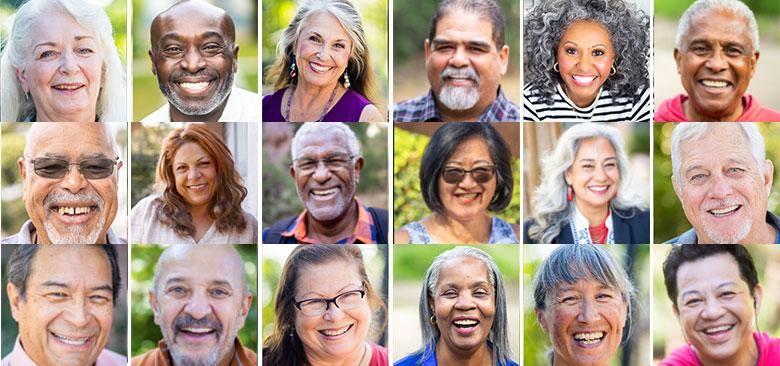
How to Meet the Needs of a Diverse Aging Society
As our multicultural nation ages, the population of older adults over age 65 is projected to become increasingly racially and ethnically diverse.
This growing diversity has significant impacts on the way people access health care, how services are delivered, and in the research that seeks to address the complex needs of older adults.
Scientists at the UCSF School of Nursing are leading projects and developing policy recommendations to improve the health of diverse older adults, and to ensure that aging research is both reflective of and responsive to their needs.
The First AAPI Registry of Its Kind in the Nation
Studies have shown that communities of color are underrepresented in research. Asian Americans and Pacific Islanders (AAPI) are among the least represented, with clinical research projects focusing on AAPI participants making up 0.17% of NIH-funded research.
 Van Ta Park To address this issue, professor Van Ta Park and her team are building a registry — the first of its kind in the country — to enable meaningful inclusion of AAPIs in clinical research studies.
Van Ta Park To address this issue, professor Van Ta Park and her team are building a registry — the first of its kind in the country — to enable meaningful inclusion of AAPIs in clinical research studies.
Backed by a $3.4 million grant from the National Institutes of Health, the CARE Registry is a database of AAPI adults who are willing to participate in research in Alzheimer’s disease and related dementias, aging, caregiving and other health topics across the lifespan.
Through community partnerships, social media and ethnic media outreach, Park and her team have recruited more than 7,600 AAPIs into the registry in the last year and a half. Each participant completes a survey — available in six languages — regarding their socio-demographic background, health, caregiving status, and willingness to be contacted about participating in research studies.
“A large reason for the underrepresentation of AAPIs in research is due to the limited outreach and engagement to AAPI communities. What CARE has demonstrated, even during a pandemic, is that AAPIs want to be engaged in conversations about research,” Park said. “They’re willing to put their names in a registry to be contacted about potential research opportunities, and this is significant, given that 80% of the 7,600 CARE participants reported having no prior experience with research.”
The registry has attracted widespread attention. Park has been invited to speak before multiple federal agencies such as the National Institutes of Health and the Food and Drug Administration. Collaboration requests have come from as far away as Australia.
Throughout the year, CARE invites researchers and community stakeholders to Brain Trust meetings to learn how the registry can help them solve the problem of underrepresentation of AAPIs in their projects. So far, the registry has received 34 data requests from scientists nationwide studying a range of topics including aging, caregiving and COVID-19 vaccination.
New Consorcio Seeks to Increase Latinx Engagement in Clinical Trials on Dementia
 Elena Portacolone The same motivation drives associate professor Elena Portacolone in her quest to increase Latinx representation in clinical trials on dementia. Latinos make up 18 percent of the U.S. population, yet they comprise about 4 percent of research participants.
Elena Portacolone The same motivation drives associate professor Elena Portacolone in her quest to increase Latinx representation in clinical trials on dementia. Latinos make up 18 percent of the U.S. population, yet they comprise about 4 percent of research participants.
“Communities of color are more likely to develop dementia but nationally, they make up a small fraction of participants in clinical trials,” Portacolone explained. “If treatments against dementia are created from trials with only white participants, it might not work well for Latinos and Black Americans.”
With a $2.4 million NIH grant, Portacolone has established a consortium among UCSF, the Alzheimer’s Association and the National Association of Hispanic Nurses to launch a one-year campaign starting this March to increase Latinx engagement in dementia research. Additional principal investigators include Adriana Perez, a Latina nurse and assistant professor at the University of Pennsylvania, and Carl V. Hill, the Chief of Equity, Diversity and Inclusion from the Alzheimer’s Association.
Through local presentations, radio talk shows, social media outreach and other tactics, the campaign seeks to educate Latinx communities in four cities — San Francisco, Boston, Miami and San Antonio — about the importance of knowing about and participating in clinical trials. In addition, it will ask people to consider enrolling in a specific clinical trial that tests a treatment to prevent Alzheimer’s disease.
If the campaign succeeds, the model could be replicated for future clinical trials.
Resources for Older Adults Living Alone With Dementia
Simultaneously, Portacolone is working on a separate study funded by a $3.8 million grant, to illuminate the barriers for older adults with dementia who are living alone to access and use essential long-term support services, such as home care aides. The study will compare how barriers differ among racial and ethnic groups.
The study hits on a staggering reality: One third of older adults with dementia in the U.S. live alone. This can affect their ability to handle essential needs, such as bathing, making meals and managing finances. It can also lead to avoidable hospitalizations.
In this NIH-funded study, Portacolone has interviewed 70 providers and is interviewing diverse older adults living alone with dementia in California and Michigan to better understand how they access and use services.
 Yulin Yang As part of the study, postdoctoral scholar Yulin Yang is analyzing population-based data from the Health and Retirement Study to compare the unmet needs and access to services among older adults with cognitive impairment who live alone and those who live with others such as spouses or children.
Yulin Yang As part of the study, postdoctoral scholar Yulin Yang is analyzing population-based data from the Health and Retirement Study to compare the unmet needs and access to services among older adults with cognitive impairment who live alone and those who live with others such as spouses or children.
“How does living alone versus living with others affect how someone accesses services?” Yang said. “Living arrangements is often not on the radar of policymakers. We want to change that.”
Portacolone’s team plans to use the findings to develop policy recommendations on how to expand services for older adults with dementia who are living alone.
Improving Training and Resources for IHSS Caregivers Working With Older Adults
Meanwhile, assistant professor Jarmin Yeh is working to meet the needs of older adults from a different approach: Training their caregivers for success.
 Jarmin Yeh The need could not be greater. The number of people living with Alzheimer’s is projected to double by 2040, according to the 2021 Alzheimer’s Disease and Related Dementia Facts and Figures in California report, which Yeh co-authored.
Jarmin Yeh The need could not be greater. The number of people living with Alzheimer’s is projected to double by 2040, according to the 2021 Alzheimer’s Disease and Related Dementia Facts and Figures in California report, which Yeh co-authored.
Meanwhile, over 520,000 caregivers currently serve over 600,500 care recipients within California’s Medicaid funded In-Home Supportive Services (IHSS) system.
With a $3 million grant from the California Department of Public Health, Yeh has spent two years implementing a 10-week dementia training program to support IHSS caregivers of older adults living with cognitive impairment or dementia. The pilot project is taking place in Alameda County.
Most of the caregivers are women and people of color. They are typically family members or friends caring for an older adult, or caregivers hired through an agency. Classes are in Cantonese, English and Spanish.
In partnership with the Center for Caregiver Advancement and the Alameda Alliance for Health, the training teaches IHSS caregivers how to identify and manage the signs, symptoms and behavioral changes related to Alzheimer’s disease to maximize the care they provide to their care recipients. In addition, they learn self-care strategies, an important skill to thrive in a role that can be emotionally taxing.
The goal is to train 600 IHSS caregivers by 2024, and the team is halfway to achieving that number. To measure effectiveness, competency checks are conducted with IHSS caregivers during the training, as well as pre, post, and follow-up surveys upon completion.
If successful, the program holds potential for statewide expansion, Yeh said.
“Bolstering the workforce is an upstream intervention,” Yeh said. “Downstream, we hope to show it will save health plans money because their members will be better cared for in their homes. This can lead to decreases in costly types of services, such as emergency room visits and unplanned hospitalizations. By training IHSS caregivers as a point of intervention in the dementia care system, we’re taking a preventive approach.”



